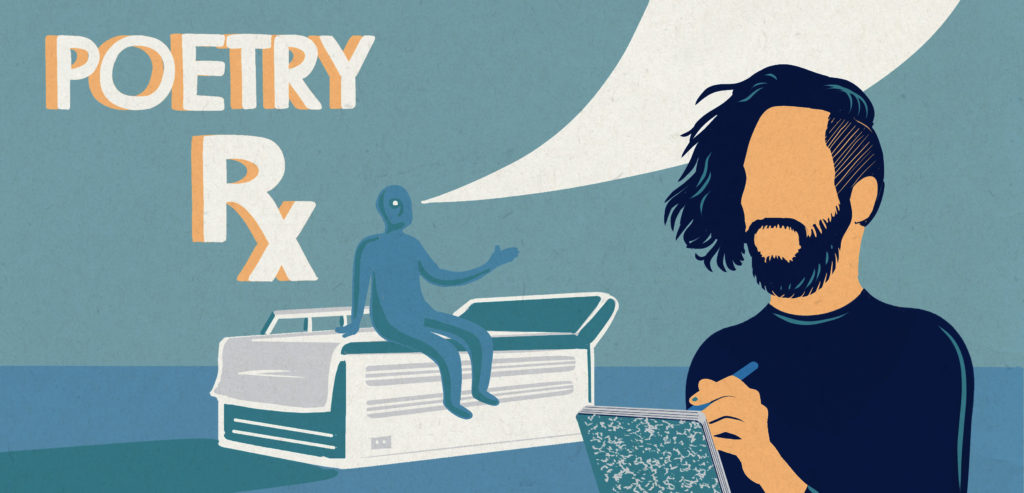In our column Poetry Rx, readers write in with a specific emotion and our resident poets—Sarah Kay, Kaveh Akbar, and Claire Schwartz—take turns prescribing the perfect poems to match. This week, Kaveh Akbar is on the line.
Dear Poets,
My little sister is in the throes of an eating disorder. She is quite literally wasting away in front of me, and she has always looked to me for advice. I feel like I should be able to be supportive and strong for her, especially since I have been dealing with an eating disorder for over five years now, but I find myself obsessing even more over my own issues and a little afraid to spend time with her. Is there any poetic advice that may give me courage to help my sister fight back the same demons that threaten me?
Sincerely,
Skinny and Scared
Dear S & S,
I want to begin by saying that if you or anyone is struggling with an eating disorder, you should be talking to a professional, not a poet. The National Eating Disorders Association helpline is available 1-800-931-2237 and I encourage you to use it—it’s available 24/7.
I don’t think I can give you a poem that will offer practical advice about how to move forward, or through, or around, your or your sister’s illness. What I can give you is one that might offer a flicker of recognition, a moment of “there we are.” Lo Kwa Mei-en’s “Pinnochia On Fire” is a fugue of searing language, a speaker’s meditation compulsion, embodiment, and hunger. One section reads:
I kept myself bony dry, a sugar
cube of vermouth: I cut myself by the grain, cool
and slender as a fuse with a sister; I missed her over
over over like a bullet train shooting past myselfthrough the tunnel of a broken heart, and on time,
not mine. But I light up like an obscene October
sky celebrating a stroke of war. When all still burnsfrom all I see, the taste of ash a horny flower on
a hard female tongue, say holiday. Say harvest. Stay
back. Stand back, trigger this. I’ll keep it real, gohurt something to love it, real, good, find the center
of aurora in me, the second of ignition.
There are moments of penetrating lucidity—“Say harvest. Stay / back. Stand back, trigger this.” The suite of imperatives rhetorically draws the “you” near even as the language ostensibly calls for the “you” to stay away. The “trigger this” reads as an offer, a plea, an inevitability.
In the case of you and your sister, it sounds to me like the best thing you might be able to offer her is your own example—she may sense you struggling with similar demons, and that struggle may be amplifying her own. When Mei-en writes, “I cut myself by the grain, cool / and slender as a fuse with a sister,” it’s hard for me to not think of you two. Your seeking help for your own condition might be the catalyst she needs to seek help for hers, a “put your own oxygen mask on first before helping others” kind of situation.
Mei-en’s poem opens with the desperate notion, “There is a line that could make you love me really.” But of course we know this is wishful thinking—in real life, there is seldom a single utterance, a magical gesture that can supplant the daily, hourly, minute-to-minute work of recovery. I hope you are able to find the help you need to carry you into and through that labor, for your sister’s sake and your own.
-KA
*
Dear Poets,
I was recently fired from my job in retail. A few weeks before, a customer accidentally left a gift card behind with a couple dollars on it, and I used it for my own purchase without thinking of it as harmful to me, the company, or the customer. It was a couple dollars. However, the card was traced back to her name, it was clear that I had wrongly taken it, and I was fired for theft. Now, I mostly feel stupid and embarrassed, but I also question whether this, and all the little lies and questionable actions of my past, says something about my character. How can I move forward from here? I’m afraid to tell anyone about this because of what they’ll think of me. I’m afraid of myself. Please, is there a poem to help me through this?
Sincerely,
Criminal?
Dear Criminal,
I’m reminded of St. Augustine’s famous prayer: “Da mihi castitatem et continentiam, sed noli modo”—“grant me chastity and continence, but not yet.” I don’t quite understand why you would need to tell anyone about the gift card (a simple “I’m looking for a better job now” would be both discrete and truthful). We make mistakes, we learn from them. The first line of Ellen Bass’s “Relax” promises: “Bad things are going to happen.” The universe authors some of them (“your parents will die,” “your cat will get run over”) and others, we author ourselves (“you’ll lose your keys,” you use up a few bucks on a seemingly forgotten gift card). The poem ends:
There’s a Buddhist story of a woman chased by a tiger.
When she comes to a cliff, she sees a sturdy vine
and climbs half way down. But there’s also a tiger below.
And two mice–one white, one black–scurry out
and begin to gnaw at the vine. At this point
she notices a wild strawberry growing from a crevice.
She looks up, down, at the mice.
Then she eats the strawberry.
So here’s the view, the breeze, the pulse
in your throat. Your wallet will be stolen, you’ll get fat,
slip on the bathroom tiles of a foreign hotel
and crack your hip. You’ll be lonely.
Oh taste how sweet and tart
the red juice is, how the tiny seeds
crunch between your teeth.
Your ability to grow, to turn your attention toward the “wild strawberry growing from a crevice” in your life, will become the real test of your character: “Here’s the view, the breeze, the pulse / in your throat.”
*
Dear Poets
I have just returned from my first solo trip. I don’t think I have ever been so happy as those seven weeks of exploration. Every small discovery or interaction with a stranger brought a renewed excitement for living. Now I’ve returned to my life in Australia and I’m struggling to maintain the traveller’s mindset of being open to beauty in unexpected places. Is there a poem to keep me going until my next trip?
Love,
European Wine Was Cheaper
Dear EWWS,
So much of my work as a poet revolves around keeping myself in a space where I can find the miraculous miraculous, the strange strange. When you say you seek to “maintain the traveller’s mindset of being open to beauty in unexpected places,” I hear you saying the same thing—but! One expects to encounter beauty when they travel. One expects the Parthenon to be breathtaking, the fruits at the bazaar to be a hyper-saturated palette of reds and yellows. The real trick is retaining that wonder when you go back home, while you’re getting your teeth cleaned (how strange that our mouths are full of bones!), or dropping off mail at the Post Office (forty-nine cents to make a letter appear across the country in just a few days!), or mowing the lawn (grass grows because it can turn light from a star 93,000,000 miles away into sugar!).
Few contemporary poets take me into this sort of wonder more wholly than Gabrielle Calvocoressi. Take her “Praise House: The New Economy.”
Her ankle’s taste. The skin
right under the knob, delicate
as a tomatillo’s shroud. All the animals
that talk to me. That I finally let them
talk to me. The blessing of waking
early enough to watch the fox
bathe itself.
The poem is a registry of occasions for gratitude. Calvocoressi’s permeability to wonder allows a lover’s ankles, moldy peaches, mashed potatoes, even bros (those oft-neglected poetic subjects) to enter her field of vision as couriers of bewilderment.
Old Bay on all my shrimp.
And justice. And cities burning
if people need to burn them to get free.
My grandmother gardening
in the late light. Sun Ra. The first time.
Paris, even though I’ve never been
there. Natal plums.
It’s important to note, too, that Calvocoressi’s spectrum isn’t limited to the kind of wonder that fills us with joy and awe—the baby sneeze, blooming sunflower kind of wonder. There is also wonder at a world that forces its people to burn cities “if people need to burn them to get free,” a world in which mothers have seizures and travelers fear airport detention. These are invitations into a different kind of bewilderment.
It’s easy to talk about the kind of wonder Whitman wrote about, boisterous and wide-eyed—and Calvocoressi has some of that yawp in her poem to be sure. But she also draws upon the kind of wonder that powered the work of Brooks, Baldwin, Rukeyser, and countless others who wrote through bewilderment at our human capacity for malice and inequity.
This all to say—I’m glad to hear your trip opened you up to beauty, to the everywhereness of excitement and baffle! Your job now will be to stay in that most writerly place of attentiveness to wonder, in all its myriad forms, wherever you may find yourself.
-KA
Want more? Read earlier installments of Poetry Rx. Need a poem? Write to us! Next week, Kaveh Akbar will be answering questions.
Kaveh Akbar’s poems have appeared recently in The New Yorker, Poetry, the New York Times, the Nation, and elsewhere. His first book is Calling a Wolf a Wolf. Born in Tehran, Iran, he teaches at Purdue University and in the low-residency M.F.A. programs at Randolph College and Warren Wilson.
from The Paris Review https://ift.tt/2AbLm3Z


Comments
Post a Comment